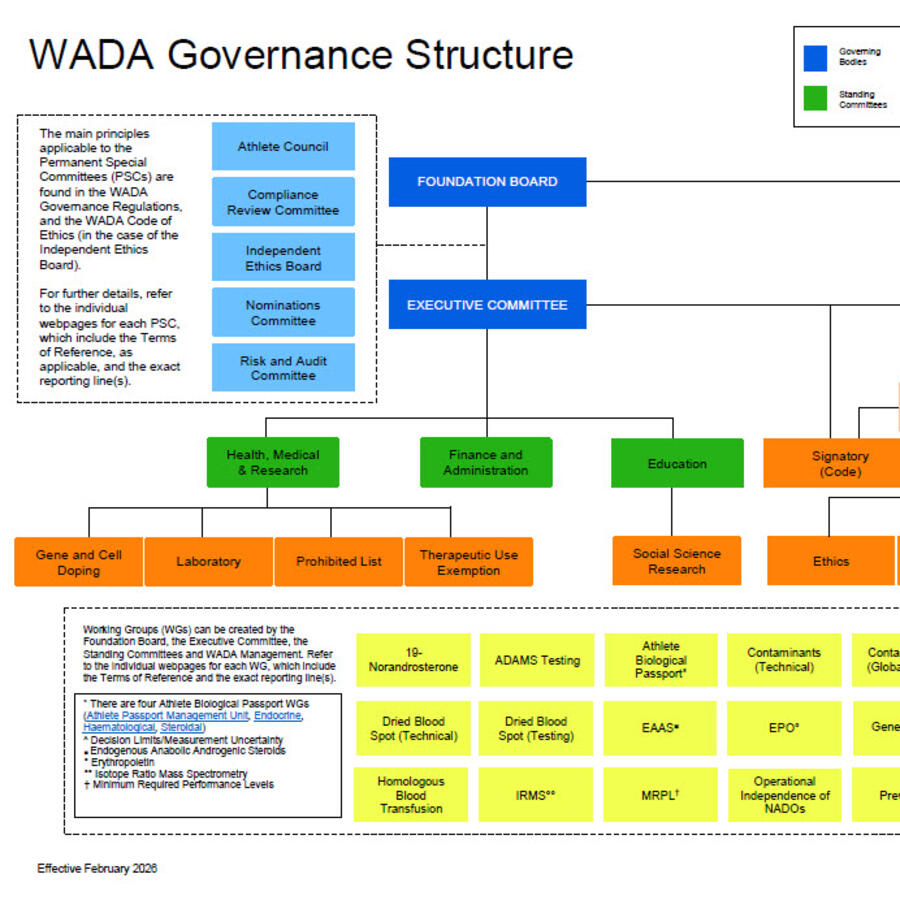Overview of WADA's Governance
WADA’s mission is to lead a collaborative worldwide movement for doping-free sport by developing, harmonizing, coordinating and monitoring anti-doping rules and policies across all sports and countries. This important and unique partnership between the Sport Movement (Olympic Movement) and Governments (Public Authorities) results from the complementary jurisdictions, expertise and powers of these two sets of stakeholders.
The Sport Movement has an inherent responsibility to maintain a level playing field and protect its integrity.
Governments provide real clout in areas where the Sport Movement cannot. They can introduce legislation that prevents the trafficking and distribution of banned substances to athletes, and they can address performance enhancing drug abuse beyond elite sport and within wider society.
Cooperation between these partners and all partners in the anti-doping ecosystem has been instrumental in the development of WADA and of the global anti-doping system.
WADA is a Swiss private law, not-for-profit Foundation. Its seat is in Lausanne, Switzerland, and its headquarters are in Montreal, Canada.


WADA’s Statutes and Governance Regulations
As a Swiss Foundation, WADA’s Statutes are approved and registered by the Swiss authorities. The current version was adopted by the Foundation Board (Board) on 14 June 2023 (with additional modifications approved on 5 December 2024) in response to the latest set of governance reforms approved by the Board in May 2022.
The Statutes are complemented by a set of Governance Regulations, which were formally approved by the Board on 14 June 2023 (with additional modifications approved on 5 December 2024) following the May 2022 governance reforms.
Governance Structure
In line with WADA’s 2022 governance reforms which are outlined further below, WADA’s current governance structure is composed of:
A 42-member Foundation Board (Board), the Agency’s highest governing body, with an equal number of representatives from the Olympic Movement (OM) and Public Authorities (PAs). The composition is as follows:
- President and Vice-President, elected by the Board and independent from the OM and PAs;
- 20 representatives of the OM, including four athletes’ representatives nominated by the OM and a further two representatives of the WADA Athlete Council (AC), as foreseen by the Statutes; and
- 20 representatives of the PAs, including two representatives of National Anti-Doping Organizations (NADOs), as chosen by the WADA NADO Expert Advisory Group.
- Members are appointed by their respective constituency groups (e.g., International Olympic Committee, International Paralympic Committee, Association of National Olympic Committees, Governments, etc.). Currently, half of the Board is made up of active or former international-level athletes.
A 16-member Executive Committee (ExCo), to which the Board delegates the management and running of the Agency, including the performance of all its activities and the administration of its assets. This includes taking all decisions that are not reserved by the WADA Statutes or by the law to the Board. The composition is as follows:
- five Independent Members, namely, the WADA President, the WADA Vice-President and three members who are proposed by the OM and the PAs, vetted by WADA’s Nominations Committee and appointed by the Board;
- five representatives of the OM, one of which is an athlete's representative;
- five representatives of the PAs; and,
- the WADA AC Chair, as elected by the AC.
- Currently, almost half of the ExCo is made up of active or former international-level athletes.
Five Permanent Special Committees, established by the Board in accordance with the 2022 governance reforms, namely:
- the Athlete Council (previously the WADA Athlete Committee from 2004 to 2022),
- the Compliance Review Committee (previously a Standing Committee from 2014 to 2022),
- the Independent Ethics Board (created through the WADA Code of Ethics in 2021),
- the Nominations Committee (created after the first round of governance reforms in 2018), and
- the Risk and Audit Committee (created after the 2022 governance reforms).
Three Standing Committees, which report on their activities to the Agency's Director General and to the ExCo upon request. They play a key advisory role in anti-doping policy and priority development for the Agency. Following the 2022 governance reforms, the Education Committee, the Finance & Administration Committee, and the Health, Medical & Research Committee are the only bodies categorized as WADA Standing Committees.
On an annual basis, at least six months before the ExCo meeting at which the vacancies will be filled, the Agency seeks nominations from its stakeholders to fill all Standing Committee vacancies.
Ten Expert Advisory Groups and several Working Groups, which report as outlined in the chart below and provide guidance or advice to the Agency in their areas of expertise.
More information on Expert Advisory Groups
More information on Working Groups
WADA strives to attain regional and gender diversity within its governance bodies and understands that it is particularly important to stakeholders. A comprehensive overview of the composition of our governance bodies is available though this link.

Governance Structure
Governance Reforms
WADA’s role has grown and the fight against doping has significantly evolved since the Agency’s governance model was formed in 1999. As with all well-run organizations, WADA has acted to ensure that its governance evolves with best practices over time.
Two rounds of reforms have been conducted since 2016 and are presented in the table below. Both were based on recommendations presented by two Governance Working Groups (2017-2019 and 2020-2022) and built upon contributions from various stakeholders.
The next review is anticipated to take place sometime between 2026-2028, i.e. three to five years after the 2022 reforms were implemented, as per the recommendations of the Working Group on the Review of WADA Governance Reforms. The three interim reports as well as the final report that the Group presented to the Executive Committe (ExCo) and Foundation Board (Board) can be found below.
|
1st round of reforms (2018) |
2nd round of reforms (2022) |
|
|
Independence |
|
|
|
Representation |
|
|
|
Accountability |
|
|
WADA Governance Working Group – Report to WADA’s Foundation Board
Working Group on the Review of WADA Governance Reforms - Reports to the WADA Executive Committee and Foundation Board
- First Interim Report - April 2021
- Second Interim Report - September 2021
- Third Interim Report - November 2021
- Final Report - April 2022
The Final Report was approved in May 2022 by the Board along with adjustments recommended by the ExCo which can be found here. The Final Report should be read together with these adjustments.
Related Resources
-
WADA Statutes: English translation of French original (official version)
Governance -
WADA Governance Regulations
Governance -
Annual Independence Declaration – President and Vice President
Governance -
WADA Code of Ethics
Governance -
WADA Governance Bodies – Aggregate Composition
See Details about WADA Governance Bodies – Aggregate Composition


